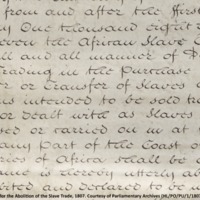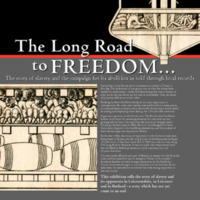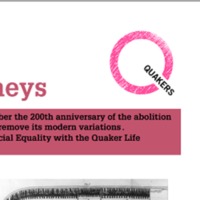
The Case for Immediate Not Gradual Abolition of Slavery
In the 1820s, the campaigner Elizabeth Heyrick became actively involved in door-to-door visits in Leicester in support of the anti-slavery cause and sugar boycotts. Her pamphlet ‘Immediate not gradual Abolition’ went into three editions during the first year of its publication in 1824. This exhibition focused on the life and work of Heyrick and in particular her efforts to abolish slavery. A Family Learning Day included ‘Elizabeth Heyrick’ in costume reading her pamphlet, storytelling, gospel music and an opportunity to sample food that would have been eaten by the enslaved.

The Long Road to Freedom
As made clear by The Long Road to Freedom exhibition in 2007, the Record Office for Leicestershire, Leicester & Rutland contains a significant collection of documents which reveal local connections with the slave trade, and with those who campaigned for abolition. Several prominent local families owned slaves on plantations in the Caribbean and on the north coast of South America. Leading Leicester abolitionists, Elizabeth Heyrick and Susanna Watts, orchestrated a vigorous anti-slavery campaign in Leicester, including a boycott on sugar. Local landowner, Thomas Babington of Rothley Temple, was a friend of William Wilberforce and hosted meetings of anti-slavery campaigners at his home. The exhibition also highlighted a unique collection of mid-19th century papers which provide access to the voices of the enslaved in a slave court in Lagos, West Africa. It also told the stories of two former slaves, Rasselas Morjan and Edward Juba, who came to Leicestershire with their owners. This exhibition toured to various venues in the region, including Abbey Pumping Station, where it coincided with family activities focused on the work of Elizabeth Heyrick.

Quakers and the path to abolition in Britain and the colonies
The Society of Friends expressed its formal opposition to the slave trade in 1727, and from that date were vocal opponents of transatlantic slavery. A virtual exhibition of archived resources, ‘Quakers and the path to abolition in Britain and the colonies’, was launched online to commemorate the bicentenary. It traced the history of the anti-slavery movement from its Quaker beginnings and highlighted key events in the Quaker history of opposition to the slave trade, and was primarily based on material from the Library at Friends House. The exhibition also explained the important role played by Quaker women abolitionists through writing and poetry. The Quakers pioneered contemporary tactics such as boycotting, petitions, leafleting and poster campaigns.
Other resources to help people find out more about the bicentenary included ‘Abolition Journeys’, developed by Quaker Life Committee for Racial Equality with the Quaker Life Children and Young People’s Staff Team, designed to help people of all ages remember the slave trade and work to abolish its modern variations.